CSotD: Whose karma is it, anyway?
Skip to comments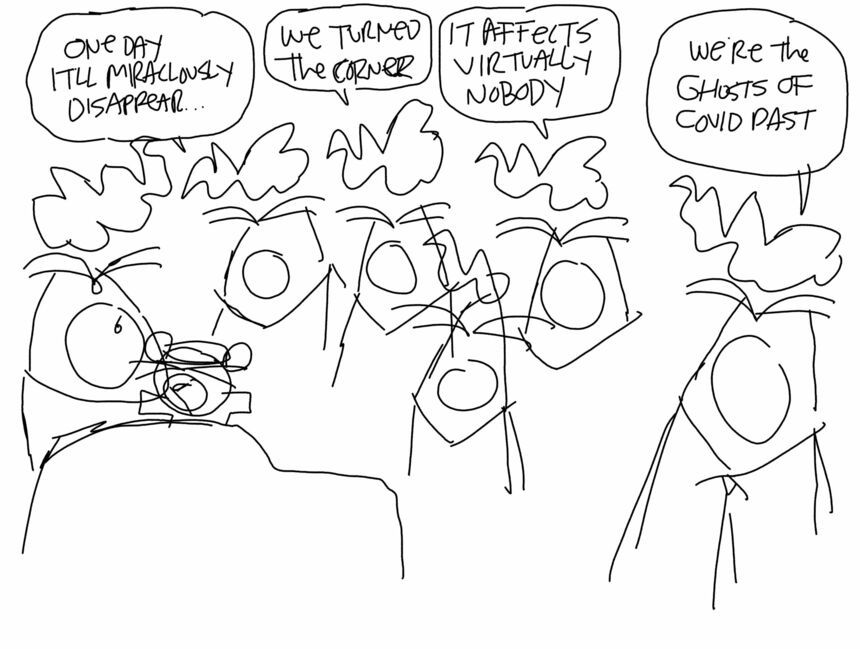
Perhaps the best way to lead off this topic is to direct you to Clay Jones’ site, where he shares various sketches and ponders aloud how to handle the President’s Covid diagnosis.

I don’t particularly care for the somewhat celebratory cartoon he eventually came up with, but he explains his feelings in greater depth in the accompanying essay to this one, and, while I firmly believe cartoons must stand alone, it provides a chance to peek behind the curtain on an occasion when we all need to not only analyze how various cartoonists got to where they landed, but do some looking inward as well.
I don’t wish Donald Trump harm. I’m not even going to say he deserved this. Honestly, it shouldn’t surprise anyone he caught it with the way he approached it. He exercised zero caution. Protect America? He couldn’t protect himself. He couldn’t protect his family. Donald Trump testing positive isn’t as much karma as it was inevitable.
And he’s right that it isn’t “karma.” Karma happens after you’re dead.
It may be “ironic,” but the world is not inherently moral, or, at least, not this one.
I think Jones’ term is closest to appropriate: “Inevitable.”
Hence this
Juxtaposition of the Day

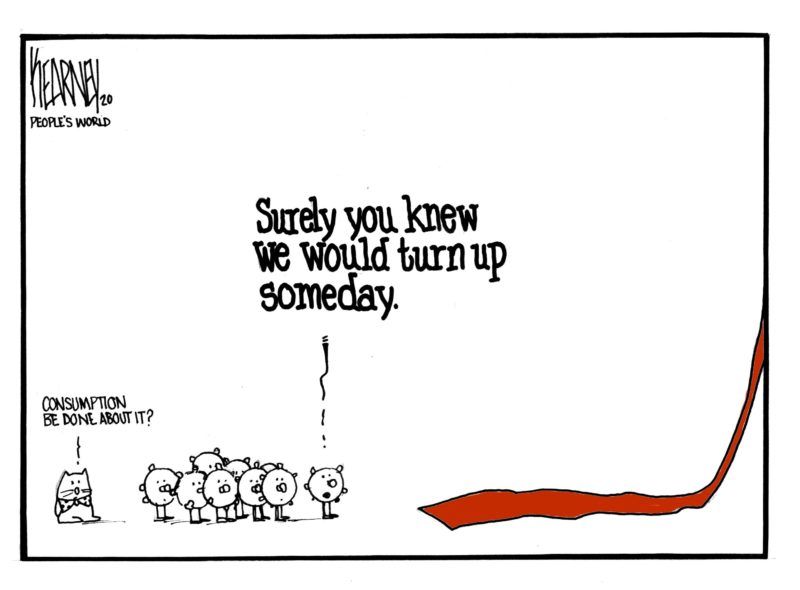
I like both expressions here, because it’s not simply that Trump failed to exercise proper caution but that he made rejecting that caution part of the re-election campaign he launched as soon as he took office.
Rogers walks a tightrope here, using a bit of humor but not going for what would be a distasteful belly-laugh over it, but I think Kearney edges him out by using whimsical graphics that combine for a completely grim cartoon.
Our responses might be similar in the aftermath of a drunk-driving accident, differing depending on whether it’s someone who inadvertently had too much at an office party versus someone who repeatedly gets sloshed and drives home anyway.
We don’t have to like ourselves for responding that way, but we do, and how we handle that fact is what is now on the table.
The term “virtue signaling” is being used a lot in social media, mostly to criticize people who have been anti-Trump but now say we should wish him a safe recovery.
It feels to me like a kind of jiu-jitsu, in which you virtue signal by announcing that other people are virtue signaling, but not you, by golly.
We should, indeed, admire you for the way in which you avoid virtue signaling!
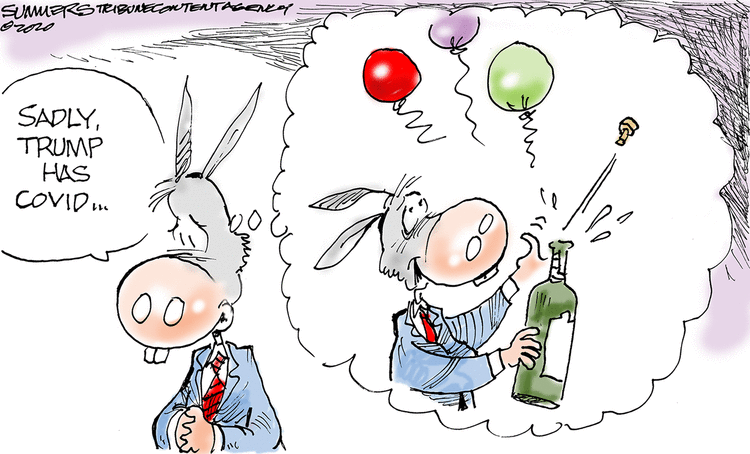
Dana Summers (Tribune) provides an example: By assuming he can see into the hearts of Democrats, he lets us know he’s not like them.
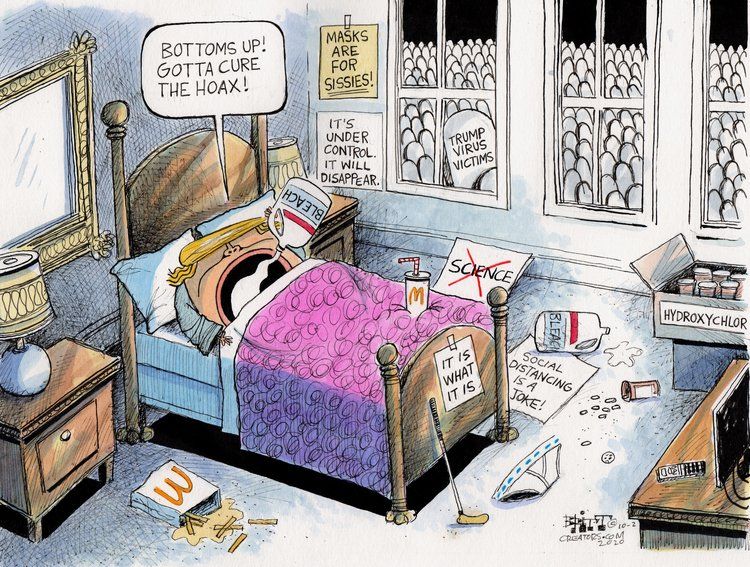
By contrast, Chris Britt (Creators) makes a point of the degree to which Trump flouted good sense, and, while Jones was more celebratory that I would have liked, I think Britt piles on way too much for the moment.
Your mileage certainly may vary.
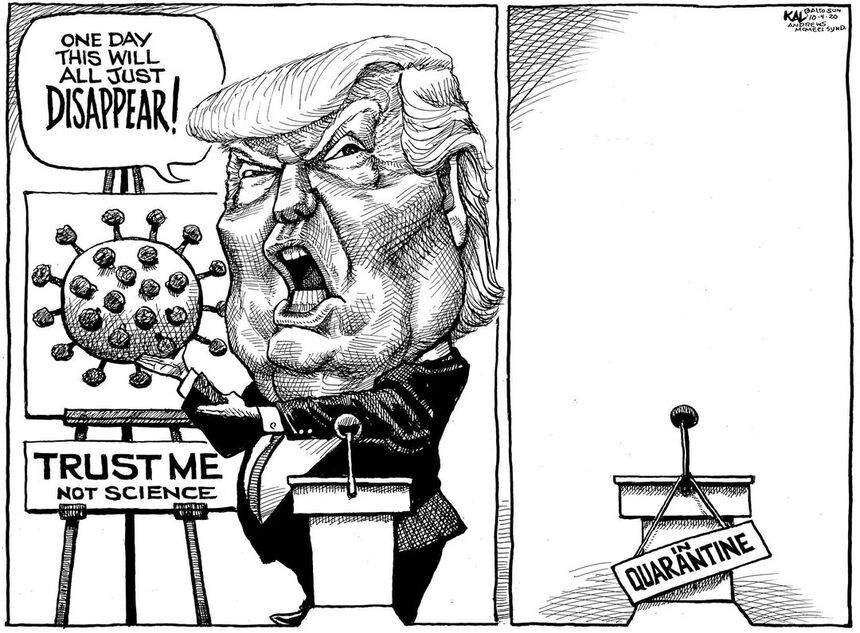
Meanwhile, Kal Kallaugher (AMS) simply lays it out, making roughly the same point as Rogers and Kearney but with no humor to lighten the matter. He’s not citing karma, which suggests a moral judgment, but, rather, hubris, the pride that, in Greek tragedy, brings great men to grief, in a combination of pity and terror.
At which point I went off to find Aristotle’s half-remembered requirements for tragedy and stumbled upon this excellent encyclopedia entry which I strongly recommend for those who were not lashed to Greek oars in college.
It includes Sir Philip Sidney’s remark about “high and excellent tragedy, that…with stirring the affects of admiration and commiseration teacheth the uncertainty of this world and upon how weak foundations gilden roofs are builded.”
Bottom line: If you can’t summon pity for the way Oedipus and Jocasta innocently stumbled into their star-crossed marriage, you won’t be able to feel the terror of feeling it could happen to you.
And, if you think it can’t happen to you, well, Grasshopper, that’s a bit of internal virtue signaling.
Better, I think, to take the lesson and learn from it, as seen in this
Juxtaposition of the Day #2
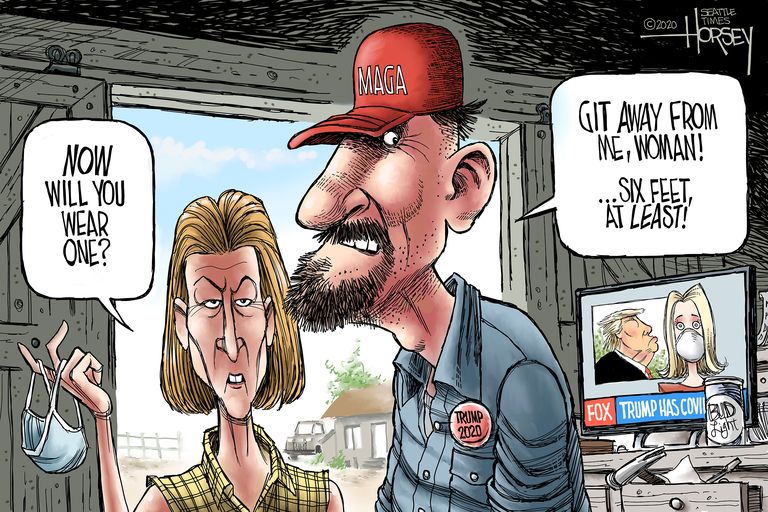
(David Horsey – Seattle Times)

I particularly like Horsey’s depiction of a hardscrabble, blue-collar couple because that’s who I grew up with, and plain-spoken can also be well-reasoned. Let’s hope there are more like him out there, who may feel culturally bound to one position but who are thinking things through and will, in the end, behave with common sense.
Meanwhile, Milbrath comes from a different, though related, viewpoint, suggesting adjustments for those who may be struggling a bit more with the news and predicting that they may not find it necessary to have a complete change of political loyalties in order to come into alignment with sensible behavior.
Her piece could also have been juxtaposed with Britt’s — echoing his frustration with months of denial and poppycock, but adding an ever-so-slight hint of compassion to her criticism.

Finally, Martyn Turner (Irish Times) offers a view I almost began with, because, rather than, like Jones, showing how cartoonists might struggle with the news, he offers a more broad-based perspective on how we’re all struggling.
There are certainly enough opinions on social media to cover the spectrum he lays out, from the aforementioned virtue signaling of the schadenfreude crowd to conspiracy theories that Trump is faking it to avoid the next debate or perhaps the entire election, to cynical suggestions that he’s much sicker than the White House is letting on.
To that last, I’d note that, while we’re not in 25th Amendment territory now, the public was not told how badly Reagan was injured in that assassination attempt, nor the seriousness of Ike’s heart attack, nor the extent of damage in Wilson’s stroke, and, for that matter, Grover Cleveland had a malignant tumor, and much of his upper jaw, removed without telling the public at all.
None of which proves a damn thing about Donald Trump. Stay tuned to the news.
Meanwhile, bear in mind that his disease has nothing to do with karma.
But your response might.
Comments 10
Comments are closed.